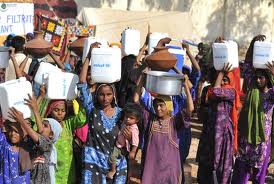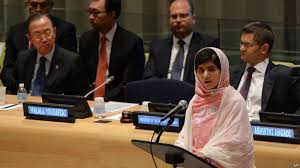Water Scarcity: The Making of a Pakistani Tinderbox?
Jul 24th, 2013 | By admin | Category: Water IssuesBy Suzanne York, www.howmany.org
According to a new report from the Asian Development Bank (ADB), Pakistan is “one of the most water-stressed countries in the world, not far from being classified, ‘water-scarce’.”
This has huge implications for the world’s sixth most populous country, which currently stands at 182 million people. Projections released last month by the United Nations show that number is expected to hit 271 million by 2050. A growing population cannot be ignored in a nation with great security and terrorism concerns, high rate of gender inequality, a growing risk of climate impacts and a history of nuclear stand-offs with India. Throw in resource shortages and things get very dicey.
The ADB report states that “At present, Pakistan’s storage capacity is limited to a 30-day supply, well below the recommended 1,000 days for countries with a similar climate. Climate change is affecting snowmelt and reducing flows into the Indus River, the main supply source.”
While there is little that can be done to magically create more water, conserving and using what exists of this most precious of resources more efficiently is one solution, along with supporting greater human rights, especially for women.
Conserving Valuable Resources
The ADB calls for increases in storage capacity to manage periods of low snowmelt and low rainfall, as well as the rehabilitation of the distribution system to reduce losses. Pakistan also suffers from much erosion due to high rates of deforestation and will need to increase forest areas through reforestation.
The building of dams on the Indus and other Himalayan rivers by India has already created serious political tensions that call for intervention by world governments. Fair and equitable treaties on water usage in the region should be hammered out.
Pakistan is also relying on inefficient farming techniques. Investment in modernizing some of its agriculture industry is sorely needed, and using better and more efficient irrigation and drainage systems.
Invest in People
Pakistan must do more to empower women and girls. There is a great need to provide family planning services and other healthcare. The total fertility rate in Pakistan is 3.6. Recognizing the rights of women and girls will aid in stabilizing the population; furthermore, women tend to invest in their families and communities and take care of their environment.
Another solution is to provide universal education to girls (and boys). Pakistani Malala Yousafzai, shot by the Taliban for advocating girls’ education, just gave a speech to the UN calling on the world to invest in education. In a land where 50 million Pakistanis cannot read or write, two-thirds are women (this is the third highest in the world).
Two-thirds of Pakistanis are less than 30 years old, and the median age is 21. Along with education to better their lives, young people also need jobs. And they need comprehensive family planning and reproductive health services to enable them to make healthy and informed decisions. Sixty-one percent of Pakistanis live on $2 per day or less. The problems of a young, uneducated, and unemployed population will only be exacerbated by water shortages.
Population and Resource Shortages
Aziz Nayani wrote in The Atlantic that “A growing population without the resources it needs to survive, let alone thrive economically, will throw the country into a period of instability that may be far worse than anything we see today.”
The Taliban, nuclear weapons, and unempowered people make for a frightening situation, with or without resource shortages.
Pakistan isn’t the only country that needs global attention and investment, but as a large recipient of U.S. foreign aid, more of that money must be directed toward women, men, youth and communities to empower them to effectively confront the looming resource challenges. It is an investment that can’t be postponed.
Suzanne York is a senior writer with the Institute for Population Studies.
[photo credits: fieldnotes.unicefusa.org and rferl.org]


